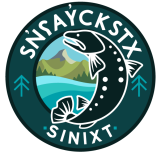Photo of sqəql̓qílaʔxʷ (bog orchid / Habenaria dilatata) blooming in Sinixt territory.
Language Revitalization
As Sinixt, we understand the vital importance of language revitalization for the well-being of our people. We are grateful to our language partners at the Salish School of Spokane and The Inchelium Language House for their efforts to bring n̓səl̓xčin̓ ![]() (click to play) fluency back to Sinixt families and other n̓səl̓xčin̓-speaking people.
(click to play) fluency back to Sinixt families and other n̓səl̓xčin̓-speaking people.
About n̓səl̓xčin̓
n̓səl̓xčin̓ ![]() is a Southern Interior Salish language related to the Kalispel, Spokane, and Wenatchee Salish languages. n̓səl̓xčin̓
is a Southern Interior Salish language related to the Kalispel, Spokane, and Wenatchee Salish languages. n̓səl̓xčin̓ ![]() is spoken by several bands and tribes in the upper Columbia, Kootenay and Okanagan River basins. The word for this common language of the land can be said and spelled in different ways: n̓səl̓xčin̓
is spoken by several bands and tribes in the upper Columbia, Kootenay and Okanagan River basins. The word for this common language of the land can be said and spelled in different ways: n̓səl̓xčin̓ ![]() / n̓syil̓xčn̓
/ n̓syil̓xčn̓ ![]() / nsyilxcn.
/ nsyilxcn.
Listen to the pronunciation of these common n̓səl̓xčin̓ ![]() words:
words:
sn̓ʕay̓čkstx
How to pronounce Sinixt
way̓
How to pronounce hello
lim̓lm̓tx
How to pronounce thank you
pútiʔ kʷu aláʔ
How to pronounce We are still here
pútiʔ aláʔəl̓x
How to pronounce They are still here
Sn̓x̌ʷn̓tkʷitkʷ
How to pronounce Columbia River
Ky̓ʕamlúp
How to pronounce Nelson
Kp̓iƛ̓l̓s
How to pronounce Castlegar
Skxikn̓
How to pronounce Revelstoke
Language vs. Tribal Identity
The root of n̓səl̓xčin̓ ![]() is the word sil̓x
is the word sil̓x ![]() , which can also be said and spelled syil̓x or syilx. sil̓x
, which can also be said and spelled syil̓x or syilx. sil̓x ![]() means “Salish people”. The word sil̓x
means “Salish people”. The word sil̓x ![]() does not designate any particular band or nation. Rather, it refers to all Salish people, especially those who speak n̓səl̓xčin̓
does not designate any particular band or nation. Rather, it refers to all Salish people, especially those who speak n̓səl̓xčin̓ ![]() . The additions n̓– čin̓ / n̓–čn̓ / n–cn turn the root word sil̓x
. The additions n̓– čin̓ / n̓–čn̓ / n–cn turn the root word sil̓x ![]() (Salish people) into a word meaning “Salish people’s language”.
(Salish people) into a word meaning “Salish people’s language”.
In the 20th century, non-Indigenous researchers and colonizers began to use the English name “Colville-Okanagan” for n̓səl̓xčin̓ ![]() . We do not use this term, because it confuses tribal and national identity with language. The language that one speaks does not determine one’s nationality. We understand that Canadians and Americans are distinct people living in two separate nations, even though English is widely spoken in both countries. Likewise, Sinixt people are distinct from San Poil, Methow and Okanagan peoples, even though we all speak n̓səl̓xčin̓
. We do not use this term, because it confuses tribal and national identity with language. The language that one speaks does not determine one’s nationality. We understand that Canadians and Americans are distinct people living in two separate nations, even though English is widely spoken in both countries. Likewise, Sinixt people are distinct from San Poil, Methow and Okanagan peoples, even though we all speak n̓səl̓xčin̓ ![]() .
.
Sinixt people are the sole Indigenous people who can assert sovereignty in traditional Sinixt territories. It is a violation of our inherit sovereignty for non-Sinixt people, bands or nations to claim any kind of sovereignty in Sinixt territories just because they speak n̓səl̓xčin̓ ![]() or use the terms sil̓x
or use the terms sil̓x ![]() or syilx (Salish people) for themselves.
or syilx (Salish people) for themselves.

